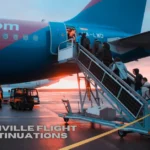Introduction
jacksonville flight discontinuations , the vibrant city known for its stunning beaches and rich culture, is facing a growing concern: flight discontinuations. Travelers are finding fewer options when trying to book flights from Jacksonville International Airport (JAX). As airlines cut routes, both leisure and business travelers feel the pinch. This trend raises pressing questions about the future of air travel in this bustling hub. What’s behind these changes? Are we witnessing a shift that could impact not just our travel plans but also local businesses reliant on tourism? Let’s explore what’s really going on with Jacksonville flight discontinuations and what it means for us all.
The recent trend of flight discontinuations in Jacksonville
Jacksonville is currently facing a noticeable rise in flight discontinuations. Travelers have felt the impact as airlines withdraw routes, leaving fewer options for both leisure and business travel.
Many residents are frustrated with limited choices when planning trips. This trend can seem alarming, especially given Jacksonville’s growing population and economy.
The city’s airport has seen several airlines drop service completely or scale back their offerings. What was once a bustling hub is now quieter, leading to increased concerns about accessibility.
As competition among carriers intensifies, Jacksonville struggles to maintain its position as an attractive destination for air travel. The result? A shrinking network of flights that makes it harder for everyone involved—travelers and local businesses alike—to thrive in this evolving landscape.
Factors contributing to this trend including airport infrastructure, demand, and competition
Several factors are driving the increase in Jacksonville flight discontinuations. One key issue is airport infrastructure. While Jacksonville International Airport has made strides, it still struggles to keep pace with the growing demands of both travelers and airlines.
Then there’s demand—or rather, a lack of it for certain routes. As travel preferences evolve, some destinations have simply fallen out of favor with passengers. Airlines respond by cutting services that no longer make financial sense.
Competition plays another significant role. With nearby airports offering more options or cheaper fares, many airlines redirect their resources elsewhere. This leaves Jacksonville at a disadvantage when trying to retain existing carriers or attract new ones.
These intertwined elements create a challenging environment for air travel in the region, affecting not just flyers but local businesses as well.
Impact on local travelers and businesses
Flight discontinuations in Jacksonville strike hard at local travelers. Fewer options mean longer journeys to reach destinations. This can lead to increased travel costs, as residents may need to drive hours just to catch a flight.
Businesses also feel the pinch. Companies rely on efficient air travel for meetings and shipments. Limited flights disrupt schedules and cut off important connections with clients and partners nationwide.
Tourism is another casualty of these changes. Visitors seek convenience when choosing their next getaway. If they see fewer direct routes from Jacksonville, they might reconsider their plans altogether.
The ripple effects extend beyond individuals; entire industries are impacted by reduced access and connectivity. Local economies suffer as potential revenue slips away due to diminishing flight services in the area. The stakes are high for both travelers and businesses alike during this troubling trend.
Possible solutions to address the issue
To tackle the rising issue of Jacksonville flight discontinuations, a multi-faceted approach is essential.
Investing in airport infrastructure can make Jacksonville International Airport more attractive to airlines. Upgrading facilities and improving passenger experiences could enhance operational efficiency.
Promoting local tourism can also bolster demand for flights. Collaborating with travel agencies and marketing campaigns can highlight Jacksonville’s unique attractions, encouraging visitors from other regions.
Additionally, fostering partnerships with airlines might offer incentives for maintaining or expanding routes. These strategic collaborations can help secure vital connections that benefit everyone involved.
Community engagement plays a crucial role as well. Mobilizing residents to support their local airport through petitions or social media campaigns may send a strong message about the importance of air service in enhancing economic growth.
Creating a travel advisory board consisting of stakeholders from various sectors could facilitate ongoing discussions on how best to address these challenges collaboratively.
How other cities have successfully improved their air travel options
Cities across the nation have tackled air travel challenges with innovative solutions. For instance, Long Beach, California revamped its airport to enhance passenger experience and comfort. A focus on modern amenities attracted more airlines.
Similarly, Indianapolis invested in marketing campaigns that highlighted their city as a hub for connecting flights. This strategy not only increased awareness but also drew interest from low-cost carriers seeking new routes.
On the East Coast, Baltimore implemented partnerships with local businesses to offer incentives for travelers. These collaborations provided discounts and packages that encouraged tourists to fly into their airports.
Community engagement has played a vital role too. Cities like Nashville formed task forces comprising stakeholders from various sectors to address air service needs collaboratively. Listening to local input allowed them to tailor services effectively while enhancing overall satisfaction among travelers and airlines alike.
The role of government and community support in attracting and retaining airlines
Government and community support play a crucial role in attracting and retaining airlines. Local authorities can provide incentives such as tax breaks or grants, making it financially appealing for carriers to operate from Jacksonville.
Community engagement is equally important. When residents advocate for their travel needs, they create demand that airlines cannot ignore. Public forums and surveys can help gauge interest in new routes or services.
Moreover, partnerships between the airport authority and local businesses can enhance appeal. By promoting tourism and regional attractions, these collaborations show airlines the potential market waiting to be tapped into.
Investing in marketing campaigns also helps raise awareness about Jacksonville’s air travel options. Highlighting unique aspects of the city can entice more travelers—and subsequently airlines—to consider expanding flight offerings here.
Fostering strong relationships among government entities, businesses, and residents creates a supportive ecosystem beneficial for all parties involved.
Conclusion: Steps that can be taken to prevent further flight discontinuations in Jacksonville
To address the ongoing issue of flight discontinuations in Jacksonville, several steps can be pursued. First and foremost, enhancing airport infrastructure is essential. Modernizing terminals and improving amenities can attract more airlines to consider Jacksonville as a viable hub.
Next, focusing on marketing efforts that highlight Jacksonville’s unique offerings could increase demand for flights. Engaging local businesses and tourism boards in collaborative campaigns might draw attention to all that Jacksonville has to offer.
Additionally, fostering partnerships with airlines through incentives or subsidies may encourage them to maintain or expand routes. This approach has proven effective in other cities facing similar challenges.
Community involvement plays a crucial role too. Hosting forums where travelers can voice their needs helps create a clearer picture of what flights are most desired. Building this relationship between residents and airline representatives fosters an environment conducive to growth.
Advocating for government support at both state and federal levels can provide necessary funding for airport expansion projects or promotional initiatives aimed at enhancing air travel options.
By implementing these strategies collectively, it’s possible to not only prevent further flight discontinuations but also revitalize the air travel landscape in Jacksonville for years to come.






